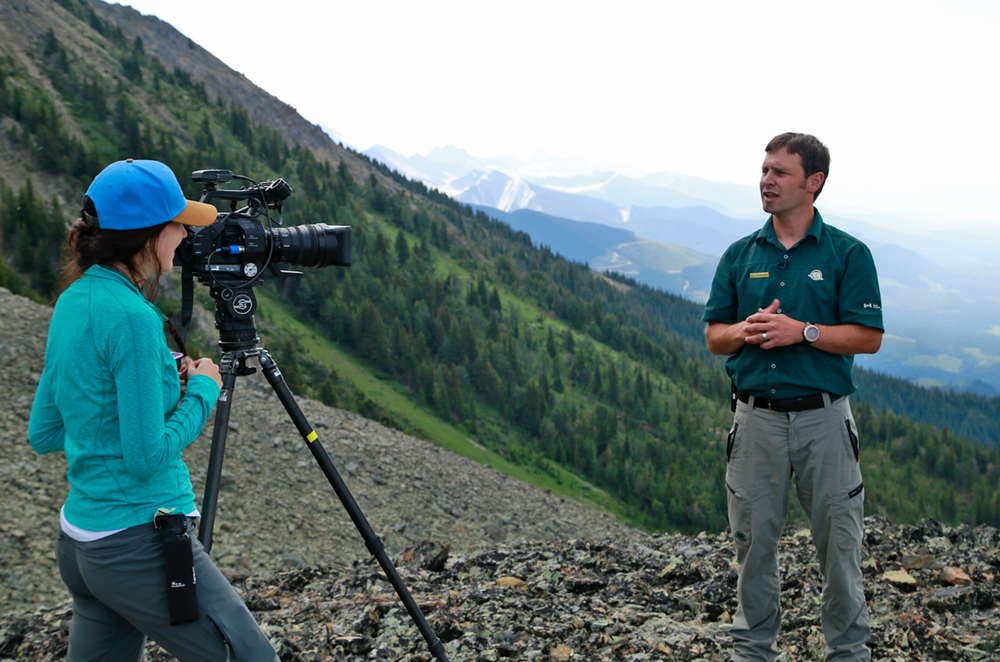Telling Stories that Matter: UM Alum Breanna McCabe

Making a documentary can require a person to wear many hats, from writer-researcher to cinematographer-editor. Producer Breanna McCabe is used to doing it all for her own features and for Montana PBS programming, but she wouldn’t have it any other way.
“If you’re like me and you’re a curious person, there’s no better job,” McCabe said. “You get to learn about so many different topics that interest you or maybe those that you never even thought of.”
Her affinity for the medium started at a young age and time spent experimenting with the family video camera.
“I spent hours looking through the tiny viewfinder and recording footage,” she said. “I’ve always been captivated by this idea that you can point a camera in a direction and preserve that moment in time.”
A Missoula native, she originally planned to head to Oregon for college, but a job shadow program at UM’s School of Journalism changed her mind and kept her closer to home. She knew pretty early on in her studies that she had made the right decision.
“We were creating work that would be seen beyond the walls of UM, beyond campus,” McCabe said “Right away we were contributing to storytelling on a broader scale. It felt like the work you were doing mattered.”
After graduation, she spent two years as a reporter for KPAX news in Missoula and another few years at a station in Spokane. She returned to UM to work as a news editor and videographer, crafting stories about the University and its students. She also began working toward her master’s in environmental journalism.
McCabe looks at nature as a thread that weaves through everyday life in Montana. Within the context of her master’s studies, she saw the way the environment connects back to culture, history and many current events. Her first documentary to air on Montana PBS started as a project during her time as a graduate student at the J-school.
She attended a story development dinner for the Crown Reporting Fellowship and was seated at a table with UM Professor Diana Six, who told McCabe and the other guests about her research on the whitebark pine tree.
“It became clear that this tree faces so many threats from different directions,” McCabe said. “I first learned about it through Diana’s research, and I learned that she’s not the only one trying to save this tree. It’s a favorite among those who know it,” McCabe said.
McCabe began working on “Ghost Forests,” traveling to the Flathead Indian Reservation and across the border to Canada to document the whitebark pine and those working to protect it. The project was no easy feat, involving hikes and helicopters to the tree’s high-altitude habitat.
“It made it that much more important because you know a lot of your viewers aren’t going to be able to see it in person,” McCabe said.
The finished documentary aired on Montana PBS and received a first honorable mention from the Society of Environmental Journalists Awards for Reporting on the Environment. Next up for McCabe is “Higgins Ridge,” a documentary on the smokejumpers rescued from a 1961 wildfire west of Missoula that will air in 2023.
She also works as a producer on “Backroads of Montana.” Montana PBS provides a lot of quality original programming, but “Backroads” seems to stand out as a fan favorite. McCabe shares the sentiment.
“It’s truly the coolest program ever,” she said. “I see why Montanans have loved it for 30 years. It showcases real Montana, real Montana stories. It’s really an opportunity to just seep into someone else’s life.”
This fall, McCabe will put her reporter hat back on for an upcoming Montana PBS Reports series titled “Impact.” Whether it's politics, history or the environment, she’s excited to keep telling stories that matter to Montanans.
“The world around us is changing so quickly and the landscape is changing so quickly,” McCabe said. “It feels really important to capture things along the way. Someone has to be there with a camera or a notebook to write that first draft of history.”